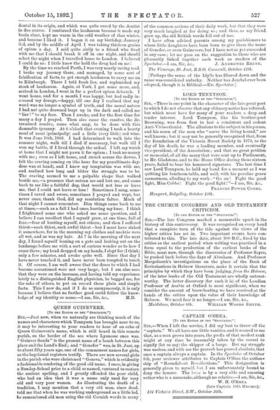THE CHURCH CONGRESS AND OLD TESTAMENT CRITICISM.
[TO THE EDITOR 07 THE "SPECTATOR."] SIR,—The late Congress marked a memorable epoch in the history of this controversy. It was recognised on every hand that a complete turn of the tide against the views of the higher critics has set in. Two important events have con- tributed to this. The late date, about 800 B.C., fixed by the critics as the earliest period when writing was practised in a form equal to the production of the earliest books of the Bible, must now, through the discoveries of Professor Sayce, be pushed back before the days of Abraham. And Professor Margoliouth's investigations on the place of the Book of Ecclesiasticus in Hebrew literature, make it certain that the principles by which they have been judging, from the Hebrew, of the later books of the Old Testament are wholly untrust- worthy. The latter discovery (for such it is) of the Laudian Professor of Arabic at Oxford is most significant, when we consider the amount of brow-beating we have received at the hands of the critics upon the value of their knowledge of Hebrew. We need fear it no longer.—I am, Sir, &c., Maidstone, October 8th. WILLIAM WOODS SMYTH.


































 Previous page
Previous page